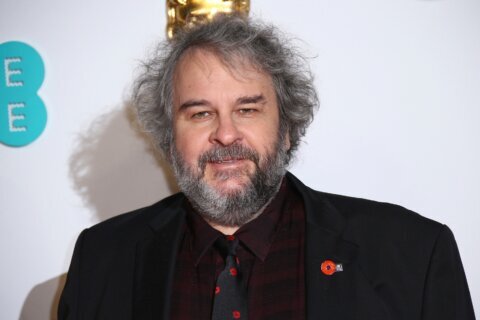Few artists captured the essence of American rock and roll like John Cougar Mellencamp.

The Rock & Roll Hall of Famer performs live at DAR Constitution Hall in the nation’s capital this Thursday night, so WTOP spoke with longtime guitarist Mike Wanchic to reflect on a career of heartland rock.
“There are a lot of songs that people hold really dear to their hearts,” Wanchic told WTOP. “Music is a major trigger for memories and emotions, those are important things to people, so we can never disregard that. There are certain songs that you are obliged to play and we love to deliver those to our crowd, but conversely, we’re still making records — we’re 23 records into our career — and John’s the best songwriter that he’s ever been right now.”
Their collaboration dates back to 1976 when Wanchic was a college graduate interning at a recording studio in Bloomington, Indiana. There, he met a young guy recording demos at the time named Johnny Mellencamp, before adopting the animalistic stage name John Cougar for the debut album “Chestnut Street Incident” (1976).
Wanchic joined Mellencamp’s band full time in 1978, meaning he was there for the early albums “A Biography” (1978), “John Cougar” (1979) and “Nothin’ Matters and What if It Did” (1980), but it was their fifth album “American Fool” (1982) that blew up biggest with hits like “Hurts So Good” and “Jack & Diane.”
“We worked on ‘Jack & Diane’ for a long time … The Bee Gees were in the studio next to us and Maurice Gibb said, ‘I’ve got this new drum machine, would you like to try it?’ … it had that little backbeat that we used in ‘Jack & Diane,'” Wanchic said. “We played (the record president) ‘Hurts so Good,’ he didn’t get it, looked at John and said, ‘Maybe we should put horns on it.’ John blew his top, shoved him out the side door of the studio and closed it. He ejected the president of the record company! They reluctantly released the album and it had two No. 1 songs.”
After their sixth album “The Kid Inside” (1983), the band’s seventh album “Uh-Huh” (1983) delivered another round of hits with the catchy “Crumblin’ Down,” the defiant “Authority Song” and the social satire “Pink Houses” contemplating the American Dream with the most bittersweet lyrics: “They told me when I was younger, said, ‘Boy, you’re gonna be president,’ but just like everything else those old crazy dreams just kinda came and went.”
“It’s a lot of the great things about America, but it also points out a lot of the inequities that exist in America where a kid thinks he can do anything and maybe he can’t: ‘There’s a young man in a T-shirt listening to a rock ‘n roll station, he’s got greasy hair and greasy smile and says, ‘This must be my destination,'” Wanchic said. “There’s all kinds of innuendo woven into the lyric of that song that’s a little more satirical than a lot of people think it is.”
The eighth album “Scarecrow” (1985) delivered “Lonely Ol’ Night,” “R.O.C.K. in the U.S.A.” and “Small Town.”
“(‘Small Town’) really does tell the tale of who and what we are,” Wanchic said. “I still live here in Bloomington, John still has a house here in Bloomington, we’re just small-town guys. … There’s like a moral fiber to the Midwest and small-town America that is undeniable and is part of the charm of America. If you lose that, you lose the identity of America, you become the corporate strip mall, and that’s what we don’t want to see happen.”
The ninth album “Lonesome Jubilee” (1987) ignited with “Paper in Fire,” “Cherry Bomb” and “Check It Out.”
“In my opinion, ‘Scarecrow’ and ‘Jubilee’ were the pinnacle of a lot of the writing when everything came together,” Wanchic said. “After ‘Scarecrow,’ which was still a guitar-based drums record, John says, ‘Hey, man, let’s all go out and learn another instrument,’ so I went away and worked on banjo, worked on Dobro, (while bandmates added steel, fiddle and accordion). That’s when we started doing instrument combinations to get different sounds.”
The band continued to land sporadic hits off the albums “Big Daddy” (1989), “Whenever We Wanted” (1991), “Human Wheels” (1993) and “Dance Naked” (1994), which featured a cool cover of Van Morrison’s “Wild Night.”
Dozens of albums have followed: “Mr. Happy Go Lucky” (1996), “John Mellencamp” (1998), “Rough Harvest” (1999), “Cuttin’ Heads” (2001), “Trouble No More” (2003), “Freedom’s Road” (2007), “Life, Death, Love and Freedom” (2008), “No Better Than This” (2010), “Plain Spoken” (2014), “Sad Clowns & Hillbillies” (2017), “Other People’s Stuff” (2018), “Strictly a One-Eyed Jack” (2022) and the newest record “Orpheus Descending” (2023).
“‘Hey, God’ is an absolutely amazing song, to me that’s the most amazing song on the (new) record,” Wanchic said. “It has relevance on all fronts: political, personal, familial, all of these different things are touched on in this song and it’s a bit of a slice of today’s political environment. It’s a remarkable record, John’s still writing beautifully, and we’ll probably be heading into another studio and making another record soon.”
Mellencamp was inducted into the Rock & Roll Hall of Fame in 2008 and the Songwriters Hall of Fame in 2018, while Wanchic was inducted into the FarmAid Hall of Fame for his philanthropic work with FarmAid since 1985.
“I was one of the four original people that got it off the ground,” Wanchic said. “I’ve been the musical producer of the FarmAid records and a consultant from the very beginning. It’s something that’s held really dear to John’s heart, his sister and brother-in-law lost a farm during that ‘Scarecrow’ era, that was one of the things that pushed that song to get written. FarmAid is still vital, still happening and will be happening next September yet again.”
Hear our full conversation on the podcast below:
Get breaking news and daily headlines delivered to your email inbox by signing up here.
© 2024 WTOP. All Rights Reserved. This website is not intended for users located within the European Economic Area.









